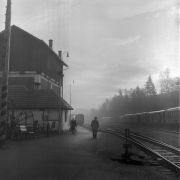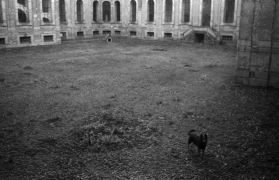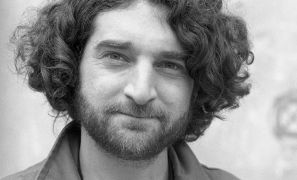Things were different. Coffee grounds caught between teeth were common indignities to discourse. We wrote letters to each other. I filled my quill with charred pinesap mixed with a shot of vodka. It was easier that way. Email was something people spoke about, but few had used. Messages arrived with daybreak like carefully folded paper airplanes gliding in and out of our minds.
Beyond the few personal belongings and camera that hung from my shoulders, the baggage I bore carried a natural inheritance, a blind spot to time beyond appearance, to things as they are. Why does something appear or behave this way? Tempered by youthful arrogance, as if my desire to be there, to be present in the moment, able to listen, to see, to apprehend the dynamics that shaped each moment I was confronting, without closet or home, bereft of experience of what came before, or what had transpired underfoot, nor knowledge of figures who had touched the river’s edge before me, or of things to come, hamstrung this way, my baggage grew heavier before it lightened.
I arrived for the first time in Czechoslovakia from the Netherlands on December 31, 1992, with little knowledge of the local situation, customs, celebratory cakes, trauma, and tumult that had shaped the preceding centuries in this consequential part of Central Europe. Fireworks launched by revellers rang out furiously and lit-up the faces of those of us crowded onto Wenceslas Square.
On that frigid, jubilant New Year’s Eve, an asymmetrical political mitosis occurred. Two post-Soviet states formed from one. People around me, it seemed, were ecstatically divided, many perhaps inebriated, or made oblivious by the promises made to them, while others, Havelites, some embittered by the secessionist’s win, eased themselves with the herbal aftertaste of Becherovka. This occasion too unfurled non-violently but lacked the transcendent hope that had propelled the Velvet Revolution just three years earlier.
Artists I met in Holland’s expat fringes, and those in its post-Fluxus aligned experimental art scene, were, like myself, either wary of or simply unprepared for art as commerce, so instead searched for alternative contexts and communities. In Amsterdam W139 was one such hub, a revolving door that welcomed itinerant and local artists, and provided a platform to share their ideas and exchange information.1
In the early ‘90’s Prague, and former East Berlin, spaces like these were exuberantly nascent in the institutionalized form of artist-run initiatives that had rooted decades before across Canada, in Holland and elsewhere. But the ethos motivating many artists to create such spaces, to bond despite our linguistic and cultural differences, to imagine new political, social, and economic formations, and to debate them in their nuanced, regionally, and historically specific articulations, required art to become our common language. Among us, Miloš Vojtěchovský, artist and animateur, was uniquely situated at the confluences of west-east, north-south discursive, geographical, and philosophical bifurcations. Contrary to his compatriot Czech and Slovak political leaders’ divisiveness, and their tallying of state assets during the Velvet Divorce, Miloš pursued an ad hoc, holistic vision that cultivated community, though equally idealistic, a mission destined to bring people together, rather than to cleave them apart.
The seeming informality of Miloš’ nearly decade-long creation of place and fellowship in Plasy was its greatest strength. Despite its growing international reputation, some financial support from the Czech Ministry of Culture and later, Pro Helvetia Ost-West, or Mondrian Foundation the heavy demands on Miloš and colleagues, Martina Tomášková, Joe Williams, Síďa Sidorjak, and many volunteers, combined with the circumspect attitude of some locals, Hermit somehow collapsed, or, as a project borne of passion and the potency of good ideas, it would later evolve into various new, vibrant entities, all significant legacies in the Czech Republic, and other creative diffusions around the globe.2
Together, Miloš and I travelled overnight by bus from Amsterdam, and then connected to a regional train in Plzen that brought us to Plasy. We stepped onto the station platform into an atmospheric cocktail. The early morning chill, brown coal smoke and fog, fused into an acrid, unexpectedly intoxicating haze.
The older man’s fedora signalled the chin-down pragmatism that can guide some people through life, those who have lived and loved long enough to tell their stories of regret, loss, uncertainty, and epochal change.
While time wielded its non-stop chisel, the decades old station clock performed dutifully without flaw, and the sun-faded drapery proudly hung behind windows obscured interiors in this small, western Bohemian enclave. The polished iron track that conveyed the weight and aspirations of generations merrily glinted in the morning sun.
The woman’s downturned eyes acknowledged a terminus to and beyond this beautiful place and between figures. The platform cleared. A whistle blew, and the train continued onwards. All was quiet in the distance.
The muscular grandeur of the monastery arose gradually as we descended the hill towards the river bottom, past tidy shops, alongside feeding chickens and the exhausted, late-season gardens planted between houses, each, it seemed, tended as if to announce common social agreement, but also, “I am free”.
David Miller, Lethbridge, 2024
1. Since its founding in 1979, when the monumental building was squatted by a collective of artists, W139 (Warmoesstraat nr. 139) has remained embedded in an engaged and intergenerational community of makers. As an artist-driven organization, today as before, W139 puts experimentation at the forefront, providing space for artists to take risks and realize experimental, urgent, and ambitious projects.
2. These include the Dawn of Magicians project at the National Gallery, Soros Center for Contemporary Art in Prague, Radio Jelení and Lemurie TAZ, The Favourite Sounds of Prague, Frontiers of Solitude project, Školská 28 Communication Space, Agosto Foundation, among others.


